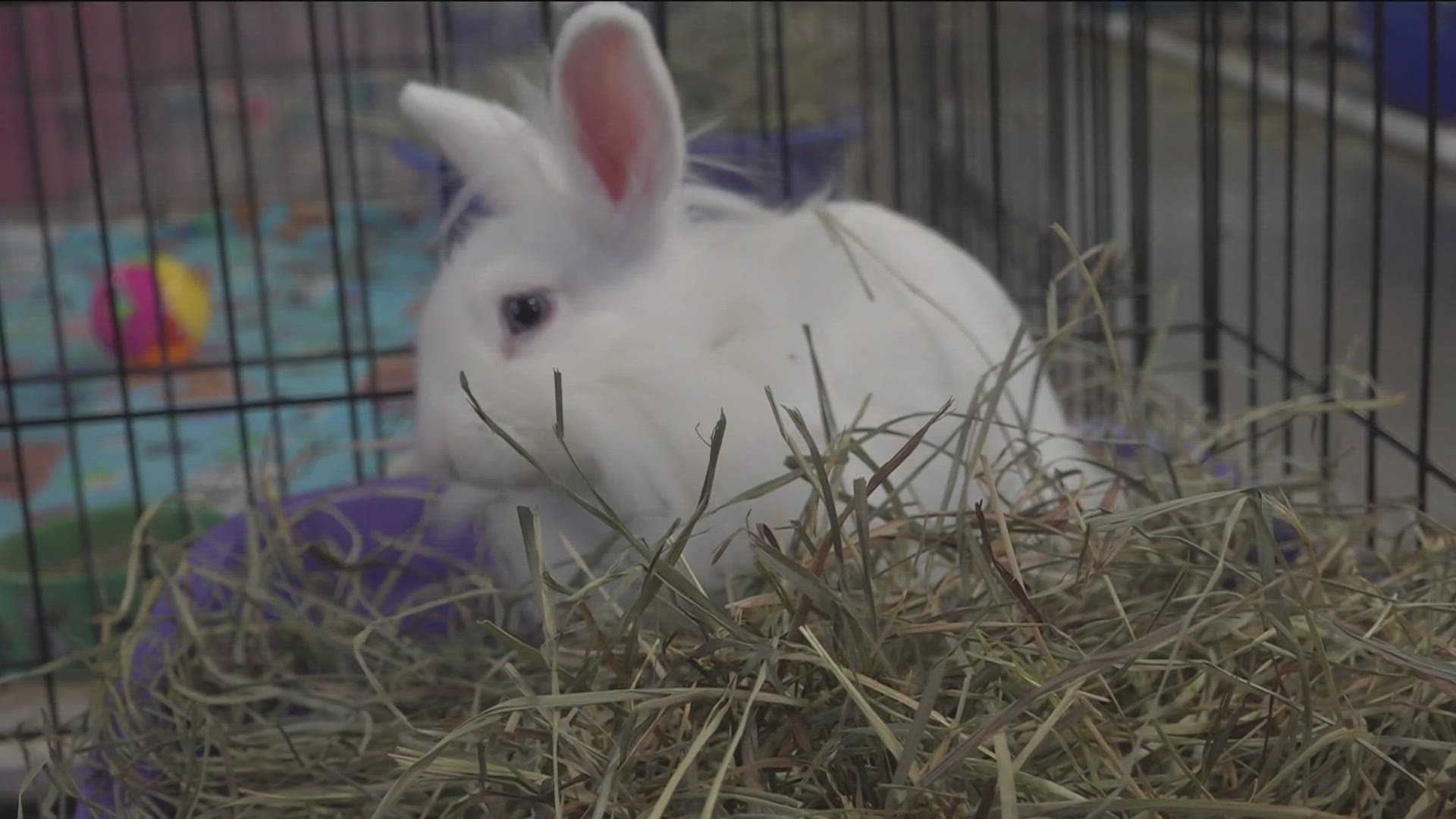SAN DIEGO — With Easter a little over a week away, animal rescue groups in Southern California are urging people not to buy rabbits as holiday gifts for children.
They say that what begins as a well-meaning gesture often leads to abandoned animals when the novelty wears off and families realize they're not equipped to properly care for the pets.
"Every year, shelters report an influx of rabbits who were bought for Easter and then discarded once their cuteness or novelty wore off," PETA's Catie Cryar told City News Service. "Some of them are bought to put in children's Easter baskets, whereas others are purchased by family photographers to be used as props for Easter photos. Rabbits are reportedly the third most commonly surrendered animals to our nation's shelters, and it's estimated that about 80% of them bought for Easter will die or be abandoned within the first year, so this is a life-and-death issue.
The animal rights group is running a public service announcement on some radio stations and spreading the message on X and other social media accounts that "rabbits are someone, not something," Cryar added. "We also like to remind everyone that adding an animal to the family should come with a lifelong commitment to them. If someone is truly prepared to provide a rabbit with a lifetime of specialized care, the answer is to adopt — not shop."
The Rancho Coastal Humane Society in Encinitas says their shelter and others nationwide come across stray bunnies who were abandoned by families that adopted them for Easter.
Instead of a live animal, rescue groups recommend buying a stuffed toy bunny or chocolate candy rabbit for kids' Easter baskets.
Nina Thompson, director of public relations for the San Diego Humane Society, told CNS that the SDHS "does not have data to support that there is an influx of rabbits coming in after Easter."
Nevertheless, "because each pet adoption is based on a detailed consultation with an adoptions counselor to ensure it is a good fit for both the animal and the person, we would not caution adopting a rabbit due to the time of year."
"Our staff at San Diego Humane Society will assist folks interested in adopting a rabbit to learn all they need to know to have a happy, harmonious relationship with their new furry friend. Part of that discussion is how long an animal is expected to live, proper nutrition and housing, and the commitment it takes to ensure they live a healthy and happy life," Thompson added.
CBS 8 spoke to San Diego House Rabbit Society who says that rabbits are not starter pets and should not be used to teach kids responsibility.
"They're not really good starter pets because they require a lot of patience and care and attention," said Jennifer Lee, San Diego House Rabbit Society Executive Director.
She says that rabbits are social animals and need a big space to roam. They are crepuscular which means they are up from dusk to dawn.
"They're up playing maybe four or five in the morning, and they're sleeping the rest of the day, and then they're back up at night playing and so housing them in a children's child's room is a little bit challenging," said Lee.
She encourages potential rabbit owners to do their research and understand the responsibility, costs and veterinarian care.
Retail sales of rabbits, dogs and cats are prohibited in California, but direct sales are still permitted, including online, and illegal street sales also occur in which baby bunnies are sometimes deceptively marketed as adult "dwarfs."
Rabbits are not low-maintenance pets. They require a specific diet, cleaning and humane indoor housing in a bunny-proofed room, and veterinary care can be expensive, advocates note.
They're also not ideal pets for small children, as they respond best to quiet energy and can be easily spooked by the hyperactivity of a child.
Animal advocates offered a series of basic tips:
- Domestic rabbits should be kept indoors at all times.
- Rabbits need to be spayed or neutered as soon as they're old enough (between four and six months) to avoid unnecessary breeding and to aid their health.
- Once they've been spayed or neutered, bunnies should be paired with a mate who's also been spayed or neutered for lifelong companionship. Single bunnies can be lonely and depressed.
- They should be fed a diet of unlimited timothy hay (or alfalfa hay for rabbits under 6 months), plus a daily portion of leafy greens and limited pellets.
- They should never be kept in cages, as they need room to hop around and exercise their legs.
- They need to be thoroughly groomed every two to three months to remove excess fur and have their nails trimmed.
- They're aggressive chewers, and need to be kept away from electrical cords and anything that can be dangerous if ingested, such as taped or glued boxes.
- Bunnies who stop eating or appear to be in pain can die within 36 hours, and need immediate care from a veterinarian trained in rabbit care.
Those who are prepared to make the 8- to 12-year commitment to caring for one or more bunnies are encouraged to consider adopting from a San Diego County shelter or local rescue group.
WATCH RELATED: County animal shelters find creative ways to increase fostering amidst overcrowding

